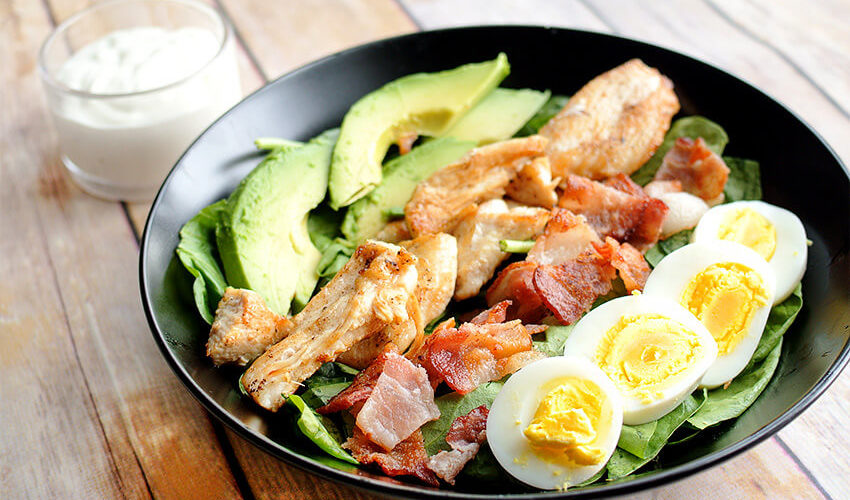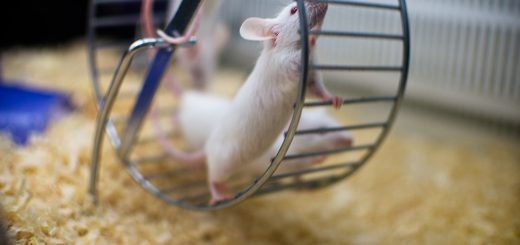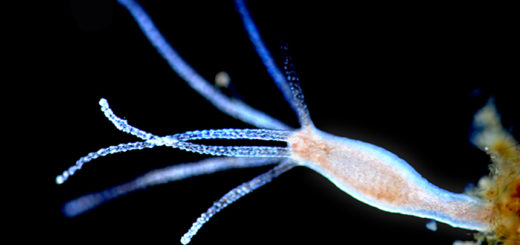Keto or Ket(NO): A Scientific Look at the Keto Diet

Fad or crash diets are nothing new, from interval fasting to cayenne pepper cleanses. Something all these diets seem to have in common is cutting out one (or multiple) food groups, and the keto diet is no exception to this. It contains 75% fat, with some protein and minimal carbohydrates, and claims to be great for weight loss, attention span, and overall energy levels and wellbeing. Is coconut oil in your morning coffee and snacking on bacon wrapped cheese really the way to get those elusive abs? Consuming steak, butter, and cheese all while shedding those pounds seems perfect. But, with evidence linking meat to cancer and strokes and the benefit of plant-based diets, is the keto diet all it’s chalked up to be?
A ketogenic diet is extremely low carb, and, as such, it excludes grains, as well as many vegetables and fruits. Instead, the daily caloric demands are met through high-fat foods (especially animal products), such as fish, meat, eggs, and dairy. Only certain vegetables are allowed, like spinach and broccoli. Carbs are limited to around 25 grams a day — the amount in a medium-sized banana.
In contrast, on a standard diet, about 45-65% of the daily calories should come from carbohydrates. The body breaks down these carbs into glucose (a type of sugar) to use for energy. When there are not enough carbs for fuel in a person’s diet, the body will enter a state called ‘ketosis’, which means the body is producing ketone bodies as it breaks down fat. Ketone bodies are, simply put, a group of three biochemical compounds made in the liver.
In a healthy individual, a ketogenic diet isn’t usually recommended for many reasons. Most of the high-fat meat recommended on a keto diet is red meat, such as beef, pork, and veal; or processed meat, including sausages and bacon. A keto diet high in animal produce is therefore full of saturated fat. Saturated fat is often referred to as the ‘bad’ type of fat because it increases LDL cholesterol in the blood. If you have too much circulating LDL cholesterol, it can form plaques in blood vessels. Plaques are a buildup of substances like calcium and cholesterol which can harden over time, making blood vessels narrower, putting greater stress on your cardiovascular system and increasing your risk of heart attacks and strokes. Moreover, in 2015, the World Health Organization officially classified processed meat as a carcinogen, a substance that is linked to the development of cancer; to emphasise this issue – tobacco falls under the same category. Red meat has also been classified as a carcinogen, though it should be noted there is not enough evidence to confirm a direct causal link between meat and cancer.
In addition, grains and vegetables, which are main sources of fibre in most diets, are consumed in lower quantities by somebody on a keto diet, meaning they are consuming less fibre. Fibre plays an important role in digestion. It’s largely indigestible and, therefore, adds bulk to stool, allowing it to soak up water and move through the gut more easily. A diet with adequate amounts of fibre (around 30 grams daily) has shown to prevent constipation and even lower the risk of colorectal cancer. His NHS article explains how these relationships were found1. In addition, fibre is beneficial in heart health, as it can protect the cardiovascular system from high cholesterol levels which are a major risk factor in cardiovascular diseases. At first glance, in healthy individuals, the diet seems to do more harm than good.
However, ketogenic diets have shown to exhibit therapeutic benefits for certain brain diseases. For example, it has been used to treat epilepsy in children; studies have found that in about 50% of cases patients had less frequent seizures after adopting a low-carb diet 2. The ketogenic diet has also shown potential for therapeutic uses against a number of brain disorders, including Alzheimer’s and Parkinson’s Diseases. Currently, there is no consensus as to whether the keto diet alone produces these therapeutic effects, but it is thought that the way ketones are used for energy by the brain has something to do with it. Research suggests that some of the by-products of breaking down ketones may have anticonvulsant effects, allowing them to be used as a therapy for drug-resistant epilepsy.
As for the brain-protective effects the keto diet is thought to have; scientists haven’t quite figured out why they occur, but some promising research has been done. The brain uses approximately 20% of our daily energy, mostly in the form of glucose. If this isn’t available, the body backup energy system kicks into action — breaking down ketone bodies to use for fuel. Turns out, despite the long-standing idea that glucose is the brain’s favourite food, ketones may be more efficient. To break down food into energy, the body requires oxygen. To break down ketones, the body requires less oxygen and conserves more energy compared to when breaking down glucose. Now, what does this mean? Ever fallen victim to that post-lunch slump? Well, it has been argued that a ketogenic diet can curb these energy slumps. The reason you feel so sluggish in the afternoon is because the glucose from carbohydrates causes your blood sugar to spike, giving you a short burst of energy, but making you “crash” an hour later. Ketones provide a more constant level of energy, maybe allowing you to forgo the dreaded crash.
In general, keto-dieters are advised to include healthy sources of fats in their diets too (hello avocados!). However, many of the other foods consumed wouldn’t typically be considered “diet-friendly”, and yet many keto dieters experience fat loss. How can that work? (Is it magic? It must be).
No, as it turns out, it’s not magic, there’s actual science to explain this apparent “weight loss”. Of course, these claims are one of the main reasons the keto diet has grown so massively in popularity. This can be linked to the increased energy levels as outlined above — constant blood sugar levels decrease cravings, causing you to eat less. At the end of the day, while there are many factors that influence weight loss, there is no secret food that will help shed the pounds, regardless if you are on a keto diet, weightwatchers or eating nothing but celery (on a serious note, do not go on a celery only diet!). So, if you feel fuller, you’ll probably eat less and therefore end up in a calorie deficit. However, generally the food consumed on a keto diet is anything but low calorie — full fat and calorie-dense all around. It’s easy to fall into a calorie surplus even with a smaller amount of food, compared to a balanced diet including lean protein, fibre-rich vegetables, and complex carbohydrates like brown rice. Much of the weight lost on a keto diet occurs at the beginning and can be put down to dehydration. Ketones cause the body to reduce sodium, which is excreted via urine. This water weight loss is not sustainable and most likely won’t last.
The bottom line is, a ketogenic diet can provide a useful therapeutic tool for various diseases and in general brain health when monitored. However, this needs to be investigated more before it can be widely and safely used as treatment. In the meantime, it isn’t recommended to anyone looking to make a healthy lifestyle change or lose some weight. A balanced diet including all food groups (carbs too) is a healthier and more sustainable approach. Carbohydrates are not the enemy of health and diets as restrictive as keto cause malnourishment and can trigger disordered eating if not monitored extremely closely. Many of the improvements claimed can also be achieved through a healthy lifestyle, with a balanced diet, exercise, and sleep. The Eatwell Guide was developed by the NHS as a point of reference for a balanced diet 3. So, unsurprisingly, a diet that recommends snacking on bacon and adding full-fat cheese to every meal still won’t be considered healthy (sorry!), but you already knew that, right?
This article was specialist edited by Sonya Frazier and copy-edited by Kirstin Leslie.











Why report on science based research and then allow anecdotal misinformation and outright ad spam in the comments?
For some reason, the comments missed our filter. Have removed now. Thanks.